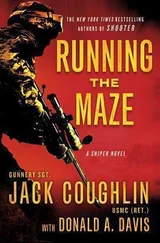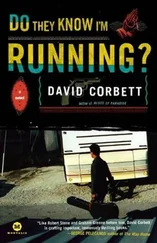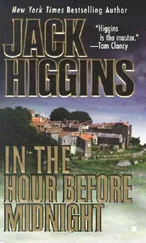Ashley threads the motorcycle through the crowd and rides on toward the west.

It rains the whole drive to La Calotterie. Mireille drives as I try to guide us by an old Michelin map from the glove box. We see the water tower as we approach the village, a circle of Romanesque arches in brick with a basin at the top. It lies on a treeless brown field on the far side of town. Mireille navigates to it by sight, zigzagging on paved and gravel roads until we find the fenced-in plot of land that borders the tower. We follow a dirt driveway up to the house and see the name glued in metal letters onto the mailbox: DESMARAIS.
Mireille looks at me.
— You still want to go?
— I don’t know. It can’t hurt to ask.
We park in front of the two-story stone farmhouse. I ask Mireille if she will do the talking. As we get out of the car, the front door of the house swings open and an elderly man looks at us. He wears a checked shirt and his pants are clasped high above a sagging paunch by a leather belt. Behind him a television blares from the living room, something about cigarette price increases in France.
— Bonjour , Mireille says. Êtes-vous Monsieur Desmarais?
The old man regards us suspiciously through pale and watery eyes. He admits that he is Monsieur Desmarais. Mireille tells him our names, touching my arm as she explains that my great-grandfather was an English soldier who was billeted near here with a family called Lefèvre during la Grande Guerre . Desmarais studies us further. He inches forward and looks at the iron sky above our shoulders, at the dirty Peugeot in the driveway.
— Bien , he says. Come inside before you get wet.
Desmarais takes our coats in his beefy hands and sets them on wooden hangers. He hooks the hangers on a curtain rod above the radiator in the living room, then he sits down in an armchair. We sit on a sofa wholly encased in yellowing plastic that adheres to our clothes and makes strange noises as we shift uncomfortably in our seats. Desmarais switches off the television.
— I live alone, he says in French. I don’t go shopping often. So I have nothing to offer you to drink.
Mireille tells him that we are fine as we are. Desmarais asks Mireille where she is from and they talk a little about Picardie. He asks Mireille if I’m English and I tell him I’m American. The old man nods.
— I knew Americans. In ’44. But you have not come to talk about that.
Desmarais glances at Mireille. He looks back at me.
— I was born in 1926. So I never met the Englishman.
— The Englishman?
— He stayed here with my mother’s family. The Lefèvres. My father’s name was Desmarais—
The old man has a strong northern accent and I understand him only with difficulty. He explains that many English soldiers stayed with his mother’s family during the war, but only one officer. His mother was a young girl then and the officer helped her with her lessons.
— The Englishman had been wounded, Desmarais says. Do you know where?
— La gorge . And in the leg.
Desmarais touches his throat.
— Oui, la gorge . My mother said he spoke very softly. I never heard about the leg.
— It’s incredible, Mireille says, that your family remembered him this long.
Desmarais shakes his head and says that it is only natural that his family remembers the Englishman. He tells us that this whole village hated the English, for to be occupied by them was only one step above having les Boches here. He says the English were low people who drank too much and caused trouble.
— They knew they were going to die. And for this piece of land?
The old man gestures toward the bleak landscape outside and says that it must be a hard thing to fight for a country that is not your own. But he says that this Englishman was different, for he was an officer and he spoke French. Desmarais holds the proof of these things. The old man goes into the next room. He is gone for some time, and when he returns he has a box upholstered in burgundy fabric. He opens it on the coffee table.
— Some of my mother’s jewelry.
He looks up at us and grins, revealing a set of crooked yellow teeth.
— Nothing valuable. That was all sold.
Desmarais pulls a small drawer in the jewelry box. He takes out a silver cross and hands it to me. The cross is square, its four arms adorned with the imperial crown, the royal cypher of George V set in the center. The medal doesn’t have its ribbon.
— What is it? Mireille asks.
— A war medal, I say. The Military Cross.
Desmarais says that it is because of this medal that his mother remembered the Englishman. For all her life the cross was hung over the mirror of her dresser. The old man stands abruptly.
— I just remembered, he says. My niece gave me a box of tea. I can make you tea.
Mireille tells him we don’t need a drink, but Desmarais insists and finally Mireille offers to make tea herself. Desmarais tells her where to find it and Mireille goes into the kitchen. The old man leans toward me with a conspiratorial whisper.
— I suppose you have come to ask about la malle .
— La malle?
Desmarais raises his eyebrows. Was it not for la malle that I had come here? I shake my head and explain that I don’t know the meaning of the word. A malle is a case for traveling, Desmarais explains, and when he was a child one would take une malle on a voyage on an ocean liner. When the English officer left this house he left behind a small malle . Later the Englishman wrote and said he would come to collect it. For this reason, Desmarais tells me, the family had kept la malle for many years and though the Englishman never came, Desmarais had now kept it too long to dispose of it.
— My niece wants me to get rid of everything in the attic. But one can’t simply throw these things away. When a man grows old he wants to keep what’s left, even if it isn’t useful.
Desmarais winks at me.
— Of course, a young man like you won’t understand. But wait until you get older—
— I believe you now.
The old man smiles with polite disbelief. I ask him what is inside la malle , but he only shrugs.
— A bunch of burned papers. You can see for yourself.
I follow Desmarais up a set of carpeted stairs to the second story, the old man gripping the rail as he climbs the steps one at a time. He asks me to fetch a step stool from the bedroom, then instructs me to stand on the stool and push up a square door in the ceiling. I push the panel and it swings open on its hinges. There is a short iron ladder that pulls down.
— Faites attention , Desmarais warns. There may be rats up there. I think la malle is next to my fishing things, on the side with the window.
I climb the ladder into the attic. The roof drops steeply on each side, the space lit by a single window that projects a shaft of light across the room, exposing the odd remnants of a long and varied life. Stacks of cardboard boxes and piles of old electronics. A few rusty fans, a rack of old coats. Everything is dusty but arranged in good order. A pair of old bamboo fishing rods is leaned against the sloping ceiling. Beneath a stack of tackle boxes I uncover a small brown trunk, my fingers carving tracks on its dusty surface. The trunk is about two feet wide and a foot deep, perhaps intended to carry boots or hats. It is crafted of leather and fitted with brass hardware. Three initials are stenciled onto the front: AEW.
The latch at the center is unlocked. I unbuckle the two brittle leather straps and pull back the lid.
Читать дальше













